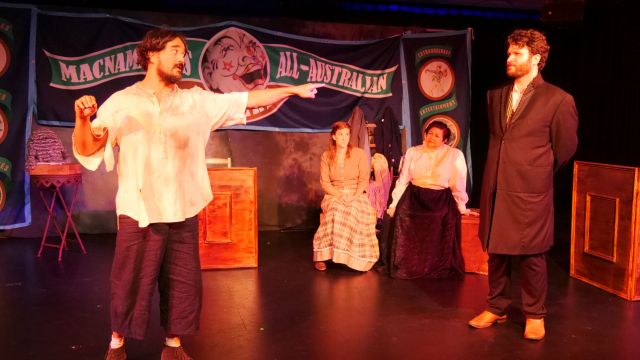Australia Felix
The Ros Packer Theatre was originally used by merchants as a Bond Store in the wool trade, and writer Geoffrey Sykes has chosen the cosy industrial looking sandstone room known as the Richard Wherrett Studio for his historical revue.
It is a good space for the piece, much of which is set at the trial and jail cell of runaway convict George Clarke in the 1830s. He was deemed to be a major threat to public safety of the colony because he befriended and lived with nine Aboriginal tribes.

The framework for Australia Felix (which is Latin for Lucky Australia) is of a travelling theatre troupe regaling an audience with songs and speeches about the exploits of Clarke, interspersed with flashbacks to some of his real-life dramas.
Clarke, also known as The Flying Barber, proved to be an adept explorer. Claims that he had discovered a great inland river came to the attention of the NSW Surveyor General Thomas Mitchell, who gave the escaped convict a temporary reprieve from his punishment whilst he explored his maps.
A strength of the piece are the ballad songs composed by Steve Wood. It starts with the band slapping their chests like a heartbeat in "a penny for a song".

It recounts that Clarke was sentenced to penal servitude for stealing a watch - lived on a barge on the Thames with "rotting flesh" before being transported to the more rotten Botany Bay.
A weakness of the piece is that none of Clarke's interactions with indigenous people are depicted on stage - but rather recounted. One of the ballads has the lyrics "remember your black life and your black wife". The audience hears about his interactions local tribes but does not see them. We are told that he escapes and obviously he learns to live off the land but don’t see it happen.

It certainly would have been difficult to stage some of these scenes authentically, but possible. More ambitious productions such as The Secret River, staged in the same theatres (upstairs) had iconic scenes with indigenous actors.
Clarke being lectured by judges and the return of a disappointed Mitchell, who confronts the bushranger in a prison cell and complains bitterly that the maps did not lead to an inland river are the major points of drama in the second act.

The five actors (Mark Alexander, Rick Buter, Kate Stewart, Tisha Kelemen and Freya Moore) enjoyed playing 16 roles set in London and Australia, with Butler on guitar having the most fun as the leader of the theatre troupe and Mitchell.
The lyrics of the one of songs that is that "we all need a bloody good show" and at the moment there is bloody good story in there, which the audience saw only one aspect of.
David Spicer
Subscribe to our E-Newsletter, buy our latest print edition or find a Performing Arts book at Book Nook.

